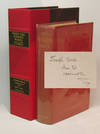
1888 - Insight into the Congressional debate regarding the Scott Act which closed loopholes that had allowed Chinese immigrants to circumvent the provisions of the infamous Chinese Exclusion Act of 1882 which had placed a 10-year ban on Chinese laborers from entering the United States
by William M. Stewart
- Used
- very good
- Condition
- Very good
- Seller
-
Virginia Beach, Virginia, United States
Payment Methods Accepted
About This Item
Restriction of Chinese Immigration. Speech of Hon. Wm. M. Stewart, of Nevada, in the Senate of the United States, August 7, 1888. Presumably published in Washington, DC at the Congressional Globe Office. Complete; stapled binding.
This 20-page speech provides one of the best concise histories of Chinese immigration into California which began with the Gold Rush when they "engaged in mining the ravines and gulches which had previously worked over by the whites . . . and very little attention was paid to them. . .. They were not regarded by the people . . . as an evil." That, however, does not mean they were seen as the equals of white settlers. In fact, "Many leading Democrats . . . in the early days in California saw the Chinese as a good substitute for slaves and advocated their importation by the State to be used for reclamation of the swamp lands . . . and production of rice. . .."
With time, miners began to resent the ever-growing Chinese presence in the gold fields, and Democratic Judge J. S. Hager became the most "zealous opponent of Chinese immigration . . . and was one of the first who discovered the Chinese evil." He was joined in his quest to prevent Chinese immigration by Free Soil politicians who feared that that Chinese coolies would be used by Democrats "to form a whole new system of slavery." Indeed, in the Southern states, the use of "coolies" was occasionally discussed as a possible augmentation of the enslaved African labor force. For its part, China was glad to provide immigrants, and after the Civil War Chinese workers arrived in droves with no apparent interest in assimilation leading Stewart and others to believe "we were dealing with a race that would overrun this country and subvert its institutions if their coming was not arrested." Thus, a bipartisan group of Californians convinced a bipartisan Congress to pass the Chinese Exclusion Act of 1882. However, loopholes in the law abounded and Chinese immigrants found it easy to evade the restrictions. Large numbers began to settle not just along the Pacific Coast but in New England and New York as well. The Scott Act, as Stewart pointed out, was written to close those loopholes.
.Interestingly, Stewart's performance as a District Attorney suggest that he was not simply a racist. In one of the first white on Chinese crimes, he successfully convicted a white "Chinese Miner's Tax" collector for murder and was outraged when the verdict was inexplicably over turned by the Supreme Court.
(For more information, see "Chinese Immigration and the Chinese Exclusion Acts" at the website of the Historian of the Department of State, Kenny's The Problem of Immigration in a Slaveholding Republic: Policing Mobility in the Nineteenth-Century United States, and the Reminiscences of William M. Stewart.)
Perhaps the only extant example of this rare monograph providing exceptional details about the history of Chinese immigration, exclusion, and the intent of the Scott Act. At the time of listing, no copies are for sale in the trade. None have sold at auction per the Rare Book Hub, and OCLC shows none held in institutional collections.
Reviews
(Log in or Create an Account first!)
Details
- Bookseller
- Kurt A. Sanftleben, LLC
(US)
- Bookseller's Inventory #
- 010174
- Title
- 1888 - Insight into the Congressional debate regarding the Scott Act which closed loopholes that had allowed Chinese immigrants to circumvent the provisions of the infamous Chinese Exclusion Act of 1882 which had placed a 10-year ban on Chinese laborers from entering the United States
- Author
- William M. Stewart
- Book Condition
- Used - Very good
- Quantity Available
- 1
- Publisher
- [Congressional Globe]
- Place of Publication
- [Washington, DC]
- Date Published
- 1888
- Bookseller catalogs
- History;
Terms of Sale
Kurt A. Sanftleben, LLC
Sales tax of 6% required for books shipped to addresses in Virginia. Standard domestic shipping is free, however additional fees may be required for heavy, oversized, or unusually-shaped items.
Returns accepted for any reason for a full refund (less shipping) if we receive the return within 14 days of shipment and items are received in the same condition as sent. Advance notice of any return would be appreciated.
About the Seller
Kurt A. Sanftleben, LLC
About Kurt A. Sanftleben, LLC
We also have a nice selection of unusual ephemera and postal history items in stock as well.
Member: Antiquarian Booksellers Association of America, Ephemera Society, Manuscript Society, American Stamp Dealers Association, American Philatelic Society, U.S. Philatelic Classics Society, Military Postal History Society
Glossary
Some terminology that may be used in this description includes:
- New
- A new book is a book previously not circulated to a buyer. Although a new book is typically free of any faults or defects, "new"...

